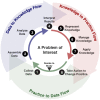The Knowledge Object Reference Ontology (KORO): A formalism to support management and sharing of computable biomedical knowledge for learning health systems
- PMID: 31245583
- PMCID: PMC6508779
- DOI: 10.1002/lrh2.10054
The Knowledge Object Reference Ontology (KORO): A formalism to support management and sharing of computable biomedical knowledge for learning health systems
Abstract
Introduction: Health systems are challenged by care underutilization, overutilization, disparities, and related harms. One problem is a multiyear latency between discovery of new best practice knowledge and its widespread adoption. Decreasing this latency requires new capabilities to better manage and more rapidly share biomedical knowledge in computable forms. Knowledge objects package machine-executable knowledge resources in a way that easily enables knowledge as a service. To help improve knowledge management and accelerate knowledge sharing, the Knowledge Object Reference Ontology (KORO) defines what knowledge objects are in a formal way.
Methods: Development of KORO began with identification of terms for classes of entities and for properties. Next, we established a taxonomical hierarchy of classes for knowledge objects and their parts. Development continued by relating these parts via formally defined properties. We evaluated the logical consistency of KORO and used it to answer several competency questions about parthood. We also applied it to guide knowledge object implementation.
Results: As a realist ontology, KORO defines what knowledge objects are and provides details about the parts they have and the roles they play. KORO provides sufficient logic to answer several basic but important questions about knowledge objects competently. KORO directly supports creators of knowledge objects by providing a formal model for these objects.
Conclusion: KORO provides a formal, logically consistent ontology about knowledge objects and their parts. It exists to help make computable biomedical knowledge findable, accessible, interoperable, and reusable. KORO is currently being used to further develop and improve computable knowledge infrastructure for learning health systems.
Keywords: BFO; IAO; KORO; knowledge management; knowledge object; ontology.
Figures




References
-
- Friedman CP, Rubin JC, Sullivan KJ. Toward an information infrastructure for global health improvement. IMIA Yearbook. 2017. https://www.thieme‐connect.com/products/ejournals/pdf/10.1055/s‐0037‐160... - DOI - PMC - PubMed
-
- Flynn AJ, Bahulekar N, Boisvert P, et al. Architecture and initial development of a digital library platform for computable knowledge objects for health. In Informatics for Health: Connected Citizen‐Led Wellness and Population Health (Vol. 235, pp. 496-500). (Studies in Health Technology and Informatics; Vol. 235). IOS Press. 10.3233/978-1-61499-753-5-496 - DOI - PubMed
LinkOut - more resources
Full Text Sources
Research Materials

